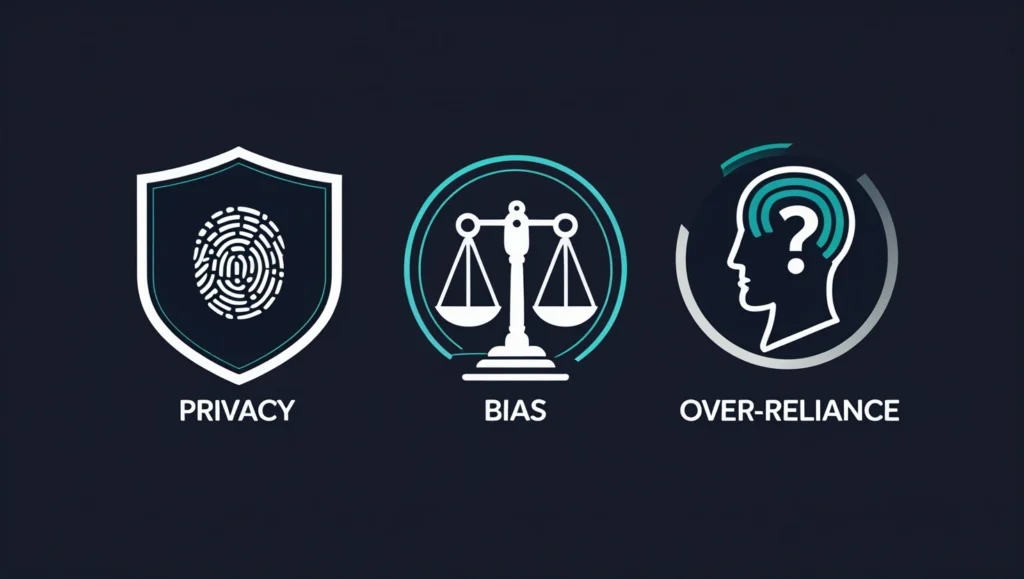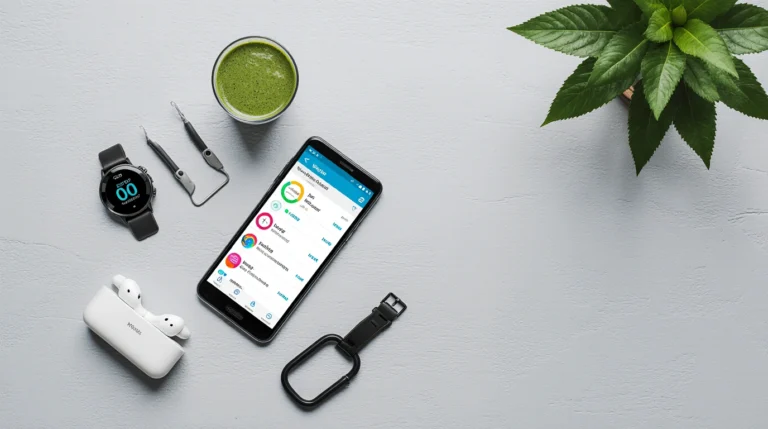The 3 Biggest Risks of AI in Healthcare You Must Know
The risks of AI in healthcare are a critical topic that every user of modern wellness technology must understand. While the potential benefits are enormous, as we’ve explored in our The Ultimate Guide to AI for Wellness, it’s crucial to approach this new frontier with a healthy dose of skepticism. Being aware of the primary risks of AI in healthcare isn’t about rejecting technology; it’s about becoming a smarter, safer, and more empowered user. This guide explores the three biggest challenges in ethical AI in wellness today.
The Big Three: Understanding the Core Risks of AI in Healthcare

Beyond simple functionality issues, there are three major ethical and practical challenges that define the “dark side” of health AI.
1. Data Privacy: Who Owns Your Most Personal Information?
This is the most significant concern for most users. When you use a health app or a wearable, you are generating a continuous stream of deeply personal data. The core questions you must ask are: Where is this data going? Who has access to it? And how is it being used beyond just showing you a dashboard? Many companies anonymize and sell this data for research, which can be beneficial, but the lines can be blurry. Strong AI health data privacy policies and user control are essential. The data from wearables, which we discuss in our Oura Ring vs. Whoop comparison, is incredibly valuable, and you must understand the terms of exchange.
2. Algorithmic Bias: When a Helping Hand Hurts
The quality of an AI’s output is fundamentally determined by the data used for its training.
Historically, a significant portion of medical research data has been gathered from specific demographics (like white males). When an AI is developed using this unbalanced data, its suggestions can be less precise or even detrimental for individuals outside that group, including women and people of color. This phenomenon is known as algorithmic bias in medicine. It can result in consequences ranging from incorrect predictions for heart conditions to mental health tools that fail to understand culturally specific expressions of stress. As authoritative organizations like the Electronic Frontier Foundation (EFF) have highlighted, without diligent oversight, AI has the potential to perpetuate and magnify existing health inequalities.
3. Over-Reliance and the “Illusion of Certainty”
AI-driven tools present data with such precision and confidence that it’s easy to accept their output as infallible. This can foster a risky dependency on the technology. A user might, for example, ignore their body’s own fatigue signals because their “readiness score” is high. Similarly, they might put off seeing a doctor because an AI symptom checker indicates their issue is not serious. This highlights a key danger of AI diagnosis and self-treatment based on incomplete data. The AI should be viewed as an advisor, not the ultimate authority.
A Case Study: When a Health AI Gets It Wrong
Consider a hypothetical but plausible scenario. A user, “Alex,” relies on an AI app that analyzes skin moles for signs of cancer. The app, trained on a dataset that under-represents a specific skin type, analyzes a photo of Alex’s mole and reports a “98% probability of being benign.” Reassured by this high-tech certainty, Alex delays seeing a dermatologist. Six months later, a doctor diagnoses the mole as a melanoma that has had time to progress. The AI wasn’t “wrong” based on its flawed data and programming, but its confident output led to a dangerous, real-world consequence. This case study highlights the real-world risks of AI in healthcare when technology is trusted blindly.
How to Be a Smart and Responsible User of Health AI
Being a critical consumer and understanding the risks of AI in healthcare is your best defense.
Tip 1:
Read the Privacy Policy (Seriously) Before you start using a new app, take five minutes to read the summary of its privacy policy. Do they sell “anonymized” data? Can you delete your data permanently?
Tip 2:
Question the Output and Look for a Second Opinion Treat every AI recommendation as an interesting data point, not a definitive fact. If an AI’s analysis feels “off,” trust your body first. Always cross-reference significant “findings” with other sources or a professional.
Tip 3:
Never Replace a Doctor with an Algorithm This is the golden rule of ethical AI in wellness. Use the data to have more informed conversations with your doctor, but never use it to replace their professional judgment.
Frequently Asked Questions (FAQ)
Is my health data being sold to advertisers?
It depends entirely on the company’s privacy policy. Reputable companies usually state that they do not sell personally identifiable data to advertisers, but they may use aggregated, anonymized data for research or internal analytics.
Can AI make medical mistakes?
Yes, absolutely. An AI can be wrong due to flawed or biased training data, algorithmic limitations, or incorrect user input. It is a tool for support, not an infallible oracle.
How can I protect my data and reduce the risks of AI in healthcare?
Use strong, unique passwords, enable two-factor authentication whenever possible, be mindful of the permissions you grant the app, and regularly review the privacy settings.








2 Comments